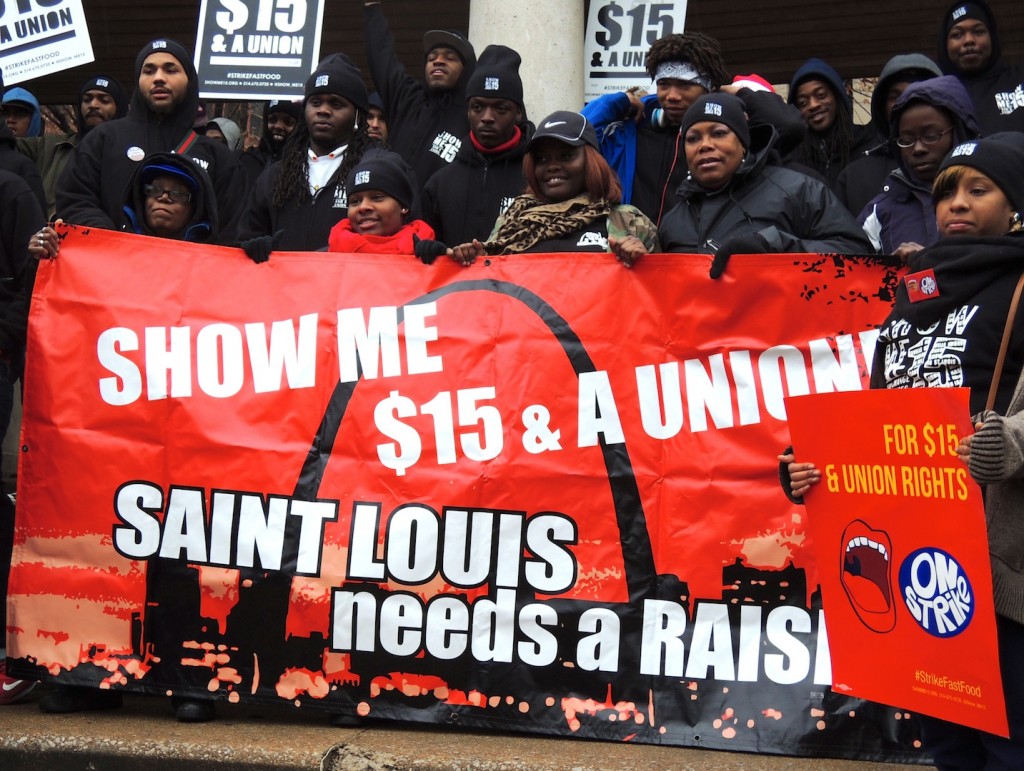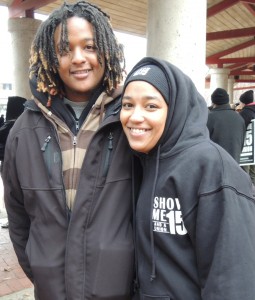
– Labor Tribune photoMovement spreads to other industries
Movement spreads to other industries
By TIM ROWDEN
Editor
St. Louis – As fast-food workers here and in 190 others cities across the country walked off their jobs Dec. 4, they were joined by a growing force of low-wage workers demanding higher pay and union rights.
Cooks and cashiers at McDonald’s, Burger King, Wendy’s and other major national chains were joined by home care workers, convenience store cashiers, discount store clerks, airport workers, Walmart employees and federally-contracted service workers demanding $15 an hour and the right to form a union without retaliation.
• Baggage handlers, skycaps, wheelchair attendants and aircraft cleaners from 10 major airports supported the fast-food strikers and the Fight for $15 movement.
• The Home Care Workers’ Fight for $15, which launched in September, more than tripled in size, reaching 19 cities from coast to coast.
• Federally-contracted food service workers at a McDonalds located at the Smithsonian Air and Space Museum in Washington also went on strike.
The mass walkout on Dec. 4 marked the two year anniversary of 200 New York City fast-food workers walking off their jobs and sparking the nationwide movement.
The strikes also came one week after Walmart workers led nationwide Black Friday strikes to protest the company’s illegal threats against workers calling for $15 an hour and full-time work.
‘STRUGGLE TO LIVE’
Justin “Skillet” Johnson, 20, who makes $7.50 an hour working the grill, cash register and groundskeeping at a McDonalds in south St. Louis City said he has to choose every month between buying groceries or paying his rent, phone bill or electric bill.
He has worked at McDonald’s for 3½ years, but has yet to see a raise.
“It’s a struggle to live,” he said. “The only decision the owners of these companies have to make is ‘Should I buy this Mercedes or that Mercedes?’ It’s not right. Something has got to be done.”
‘ALL IN THIS TOGETHER’

Danniel Polk, 26, used to work at the McDonald’s on West Florissant Ave. in Ferguson, until that store was damaged by rioting amid last month’s protests over the grand jury decision in the Michael Brown case.
Now she has to walk two hours to work at the McDonald’s in Cool Valley to support her three children, ages 9, 3 and 3 months.
Her fiancé, Jalil Whitehorn, 23, also works at McDonald’s. They make $7.70 an hour – just above minimum wage. Their rent is $400 a month. Diapers are $40 a pack.
Polk has been working at McDonald’s since she was 16. She’s been told she can’t work more than 35 hours a week – any more than that and she would be considered full-time – or risk being suspended.
“We’re all out here fighting for the same thing – $15 and a union,” Polk said. “We need to be able to stand together.
“We want people to know we’ve got order, we’ve got reason and we’ve got dignity,” she said. “We’re all in this together.”
‘FIGHTING FOR A LIVING WAGE’

Carlos Robinson, 23, works at Burger King, and has also worked at Taco Bell, Wendy’s and Arby’s. He makes $7.50 an hour.
Robinson sees parallels between the Fight for $15 and the protests surrounding the police involved shooting death of Mike Brown in Ferguson.
“The issues are not separate when you look at them from our point of view,” he said.
“I guarantee you, if Mike Brown was in somewhere working and making a decent at, that woudn’t have happened to him.
“The best thing about being a man is being there for your family, putting food on the table for them,” Robinson said. “I’m just fighting for a living wage.”
ELEVATING THE DEBATE
Indeed, the growing Fight for $15 movement has been credited with elevating the debate around inequality in the U.S.
The online magazine Slate called the movement a “stunning success” and wrote that, “dedicated fast-food workers have managed to completely rewire how the public and politicians think about wages.”
What seemed like a far-fetched goal – $15 an hour –is now a reality in SeaTac and Seattle, where Bloomberg News said the city adopted “the rallying cry of fast-food workers” and where local low-wage airport workers played a leading role in winning the historic wage increase.
In November, San Francisco became the third city in the U.S. to adopt a $15 minimum wage, and last week, Chicago lawmakers voted to raise the Windy City’s minimum wage to $13.
[box style=”0″]
Workers in new industries join movement to lift pay
Inspired by the bold, national actions of fast-food workers, other workers are joining together to boost pay in fast-growing service sector jobs.
DISCOUNT STORES
Workers from discount stores like Dollar Tree and Family Dollar and convenience stores like Speedway and BP walked off their jobs Thursday in two-dozen cities, forcing many stores to close.
“We’re overworked and paid almost nothing,” said Michael Cogshell, who works at Dollar General in St. Louis and is paid $7.50-an-hour.
“With $15 and a union I would be able to fully provide for myself. It would give me stability. We’re standing up for a change to see a difference in our community no matter where we work. This affects me and everyone I care about.”
HOME CARE WORKERS
In 19 cities, including Atlanta, Boston, Chicago, Detroit and Los Angeles, non-union and union home care workers who provide in-home support and care for senior citizens and people with disabilities joined striking fast-food workers in front of McDonald’s restaurants.
In many instances, clients protested alongside their home care providers in support of their fight for better pay.
AIRPORT WORKERS
For the first time, workers at 10 of the nation’s busiest airports joined together with fast-food and home care workers calling for $15 an hour and union rights.
Earlier this week, the workers sent a letter to the CEOs of America’s six largest airlines calling on them to partner with airports that are trying to raise wages.
“As airport workers we have pledged to stand together with people who work in home care and fast-food to fight for $15 an hour,” the workers wrote.
Workers from major airports in New York, New Jersey, Los Angeles, Philadelphia, Boston, Minneapolis, Oakland, Fort Lauderdale, Seattle, and Atlanta joined Thursday’s actions.
[/box]

